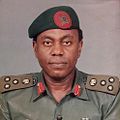Top Qs
Timeline
Chat
Perspective
List of governors of Cross River State
From Wikipedia, the free encyclopedia
Remove ads
Cross River State, located in the South South geopolitical zone of Nigeria, has undergone political changes influenced by colonial rule, military regimes, and democratic transitions. The territory, which was originally under the Eastern Region, was incorporated into the newly created South-Eastern State in 1967 following the dissolution of the regional structure by the military government.[a] In 1967, military leader Yakubu Gowon established South-Eastern State from the Eastern Region as part of a broader state creation effort during the Nigerian Civil War. The state remained under military governance until 1979, when Nigeria transitioned briefly to civilian rule. In 1976, South-Eastern State was renamed Cross River State during the nationwide state reorganisation carried out by the Murtala Mohammed administration.

Like other Nigerian states, Cross River State alternated between military administrators and civilian governors until the restoration of democracy in 1999. During the early years of the state, military officers such as Uduokaha Esuene, Paul Omu, and Babatunde Elegbede oversaw its administration. In 1979, Clement Isong of the National Party of Nigeria (NPN) became the first elected governor. However, his tenure, along with that of his successor Donald Etiebet, was interrupted by the military coup of December 1983. Subsequent military governors, including Edet Archibong, Dan Archibong, and Ernest Attah, managed the state until another brief return to civilian rule in 1992, which brought Clement Ebri of the National Republican Convention (NRC) into office. Following the annulment of the Third Republic in 1993, military administrators again assumed control, including Ibrahim Kefas, Gregory Agboneni, Umar Farouk Ahmed, and Christopher Osondu.
With the advent of the Fourth Republic in 1999, Cross River State returned to democratic governance, beginning with Donald Duke (1999–2007) of the Peoples Democratic Party (PDP). He was succeeded by Liyel Imoke (2007–2015), also of the PDP, followed by Benedict Ayade, who initially won under the PDP but later joined the All Progressives Congress (APC). In 2023, Bassey Otu of the APC was elected governor and is the incumbent.
Remove ads
List of governors
Summarize
Perspective
Eastern Region
Before Nigeria's independence in 1960, the territory that now constitutes Cross River State was part of the Eastern Region, one of the country's original administrative divisions.[4] During the colonial era, British officials governed the Eastern Region, with Clement Pleass (1954–1956) and Robert Stapledon (1956–1960) serving as governors. After independence, Francis Akanu Ibiam (1960–1966) became the first Nigerian governor of the Eastern Region, while Michael Okpara served as its second premier (1960–1966) succeeding Nnamdi Azikiwe. However, following Nigeria’s first military coup in January 1966, the military abolished the regional system, dismissed civilian premiers, and appointed military administrators, with Chukwuemeka Odumegwu Ojukwu governing the Eastern Region from January 1966 until its dissolution in May 1967.[4][5]
South-Eastern State
Following Nigeria's restructuring under Yakubu Gowon in 1967, the Eastern Region was divided into three new states: East Central State, Rivers State, and South-Eastern State.[4] South-Eastern State remained under military administration, with Uduokaha Esuene appointed as its first military governor (1967–1975). After the 1976 state reorganisation under Murtala Mohammed, the state was renamed Cross River State.[6]
Cross River State
The post-renaming era continued under military rule, with Paul Omu (1976–1978) and Babatunde Elegbede (1978–1979) administering the state.[8][9] Civilian rule was established briefly in 1979, bringing Clement Isong (1979–1983) of the National Party of Nigeria (NPN) to office, followed by Donald Etiebet in 1983.[9] The December 1983 military coup ushered in another era of military control, with leaders such as Edet Archibong (1984), Dan Archibong (1984–1986), and Ernest Attah (1986–1992) governing the state.[9] In the short-lived Third Republic, Clement Ebri of the National Republican Convention (NRC) served as governor from 1992 until the military annulled the republic in 1993. Subsequent military administrators included Ibrahim Kefas (1993–1994), Gregory Agboneni (1994–1996), Umar Farouk Ahmed (1996–1998), and Christopher Osondu (1998–1999).[9] Under the Fourth Republic, Cross River State has been governed by elected civilian governors, beginning with Donald Duke of the PDP (1999–2007), followed by Liyel Imoke (2007–2015), and then Benedict Ayade (2015–2023).[10] Ayade joined the All Progressives Congress (APC) in 2021, leaving the PDP.[11] In 2023, Bassey Otu of the APC was elected governor and is the incumbent governor.[12]
Remove ads
Explanatory notes
- Nigeria's regional system of government was a decentralised political structure where the country was divided into autonomous regions—each with its own legislature, executive, and judiciary—allowing them to govern internal affairs and manage resources independently, while still operating under a central federal authority.[3]
- Imoke's election as governor in the 2007 elections was annulled by the Court of Appeal citing irregularities and non-complaince with the 2006 Electoral Act.[38]
- The governor and his deputy joined the All Progressives Congress (APC) in May 2021, leaving PDP.[11][43]
Remove ads
See also
References
Wikiwand - on
Seamless Wikipedia browsing. On steroids.
Remove ads







